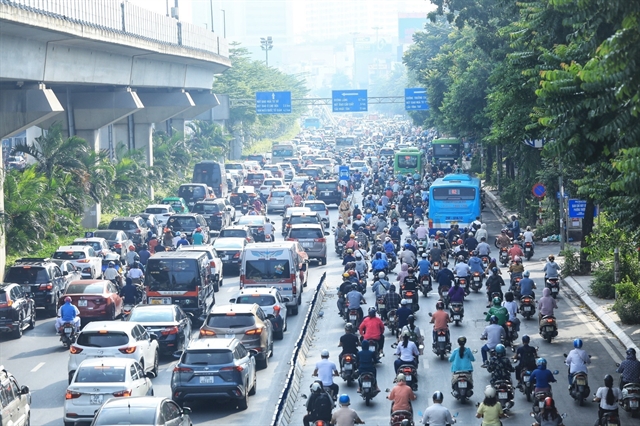 Environment
Environment


|
| Vehicles in crowded Nguyễn Trãi Street of Hà Nội's Thanh Xuân District. — VNA/VNS Photo |
HÀ NỘI — Starting from 2024, motorbike owners will be charged fees for gas emission or restricted from traffic in some areas in Hà Nội if their vehicles do not meet the emissions standards, according to the proposal from the Hà Nội Department of Natural Resources and Environment.
Recently, the department reported the results of an emissions testing programme for old motorbikes and proposed a roadmap for further emissions inspection.
Accordingly, in 2023, the city's agencies will develop a legal framework and issue a plan to control motorbike emissions as well as study zoning for air protection and restricting motorbikes.
In 2024-25 period, the city will organise an annual pilot inspections or motorbikes with five years of use or more.
In this phase, the city will also begin to apply zoning according to emissions standards.
After the pilot period, from 2026, vehicles with three to five years of use or more must undergo periodic emissions inspection, and the vehicles that do not meet emissions standards in the zoned area will be restricted from traffic.
The city will study the application of emission fees for areas according to protected zoning.
Hà Nội will build a motorbike emission control system including 170 fixed and mobile emissions testing stations and invest in a traffic camera system to detect black smoke-emitting vehicles (which could be integrated into existing traffic camera system).
This scenario can be adjusted according to the actual situation.
For example, in the early stages, when people are not yet familiar with periodic motorcycle emissions testing, the city can only control emissions by subjects (people and vehicles), and after a while, the surveillance will be on both subjects and areas. And then, when the city’s transport infrastructure and public transport are adequate, collection of emission fees will be studied, according to the department.
For the vehicles that do not meet emission standards and/or too old and worn out, the city will offer vehicle owners financial aid to buy new ones or change their jobs.
According to the department, a survey of 3,800 motorbike owners in the city showed that 86 per cent of the people supported the emissions control policy.
The testing fee agreed by the people is about VNĐ30,000-50,000 (US$1.3-2.1) each time with a frequency of once a year.
About 29 per cent of the survey participants said they would bring their old motorbikes to the collection points according to regulations.
Previously, in August 2021, Hà Nội held a motorbike emission test to assess the current emission status of old motorbikes to make a scientific basis for building and implementing solutions to improve air quality.
Random emissions testing of more than 5,200 vehicles with five years or more of use showed that these old vehicles tend to emit emissions above the permissible limit.
Specifically, the rate of vehicles not meeting level 1 of the Vietnamese standards is more than 54 per cent and not reaching level 2 is over 60 per cent.
The testing programme also offered financial support for vehicle owners to dispose of their old motorbikes and convert to new ones.
However, from November 2021 to March 2022, only four people agreed to abandon their old vehicles and received the assistance.
According to the Department of Transport, by July 2022, Hà Nội had more than 7.6 million vehicles, of which there are more than a million cars, nearly 6.5 million motorbikes of all kinds (half of them manufactured before 2000), and about 180,000 electric motorcycles. This figure does not include vehicles of other provinces circulating in the city. — VNS




